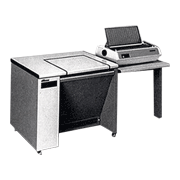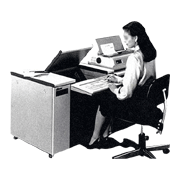In February 1982, Oki Electric Industry announced the Lettermate800 -- a Japanese language word processor with CRT display -- as a high-end model of the Lettermate80. This machine was equipped with ordinary word processor capabilities, as well as graph capability, operation capability and communication capability. These made it possible to create documents containing illustrations and tables using ruled lines. E-mail could also be sent and received using the communication function.
The main features of this machine were as follows:
- It could display and print illustrations (graphs), and this expanded the scope of application of the word processor.
- Documents could be displayed with vertical writing, so it was easy to create things like written orders, organization charts and registry documents.
- It had a function for subscripts and superscripts needed in documents like scientific papers, and thus could be used outside of the general business field.
- It had calculation capability, and enabled efficient creation of documents such as estimates, balance sheets and statistical tables.
- It allowed layout display, thus enabling the user to confirm the overall appearance of the document printing format prior to printing.
- It enabled communication between Japanese language word processors, so it was possible to quickly issue the same formal document at branch offices and other offices located at remote locations.
- An optional auto cut sheet feeder could be used to raise the use efficiency of the word processor.
- The positional relationship between the keyboard and display was designed with the emphasis on ergonomics. Fatigue was significantly reduced by minimizing line-of-sight movement and the neck swing angle.
- The main console was the desk type, to fit easily into any office. It was the space-saving type, suitable for configuring an OA-oriented office space. When not in use, the keyboard (input section) could be housed in the main console, thus turning the console into an office desk.
| Input section | Keyboard layout | Pen-touch all-character |
|---|---|---|
| Handled characters | 6,895chars (kanji, alphanumeric, kana, symbols) | |
| Characters on panel | 3,327chars (JIS level 1, alphanumeric and kana) Code input of JIS level 2 characters, 360 external characters |
|
| Common phrases | 248 | |
| Display section | Display screen | 14inch CRT, 41chars/line x 18lines |
| Screen operation | Scrolling (vertical, horizontal), screen switching | |
| Display | Characters, underline, table generation, graphs (bar, band, line, pie chart) | |
| Processing section | Creation, editing and correction functions | Underline, centering, line end justification, subscripts, framing, tab, column justification, correction, insert, delete, search, replace, move, copy, cut and paste, multiple address letters, merge (automatic inset), table generation, illustrations (graphs), layout display, line start/end rules etc. |
| Communication function (Optional) | Communication line: Public communication line Communication method: Half duplex |
|
| Utilities | Document display, common phrase display, external character creation/register Document file copy Lettermate80 document file conversion |
|
| FDD section | 8inch double-sided double-density floppy disks Approx. 120 A4 pages |
|
| Printer | Print mechanism | Wire dot impact |
| Character configuration | Based on 24 x 24 dot-matrix | |
| Character size | Basically equivalent to No. 5 movable type. Also small characters, wide characters and large characters | |
| Font | Minchotai | |
| Print speed | 40chars/s | |
| Spacing | Character spacing: 6 levels, Line spacing: 11 levels | |
| Printed characters per line | Max. 75chars/line | |
| Paper | B5, A4, B4, continuous paper with max. width 16inch(optional) | |
| Number of copies | 3 | |
| Other | Pin tractor feed unit, auto cut sheet feeder | |
| Other | Main unit Dimensions | W800mm x D700mm x H700mm |
| Power supply | AC100V±10% | |
| Power consumption | Approx. 0.45KVA | |
| Environmental conditions | Operating Temperature 10 degrees C - 35 degrees C Operating Humidity 30-80%RH | |



